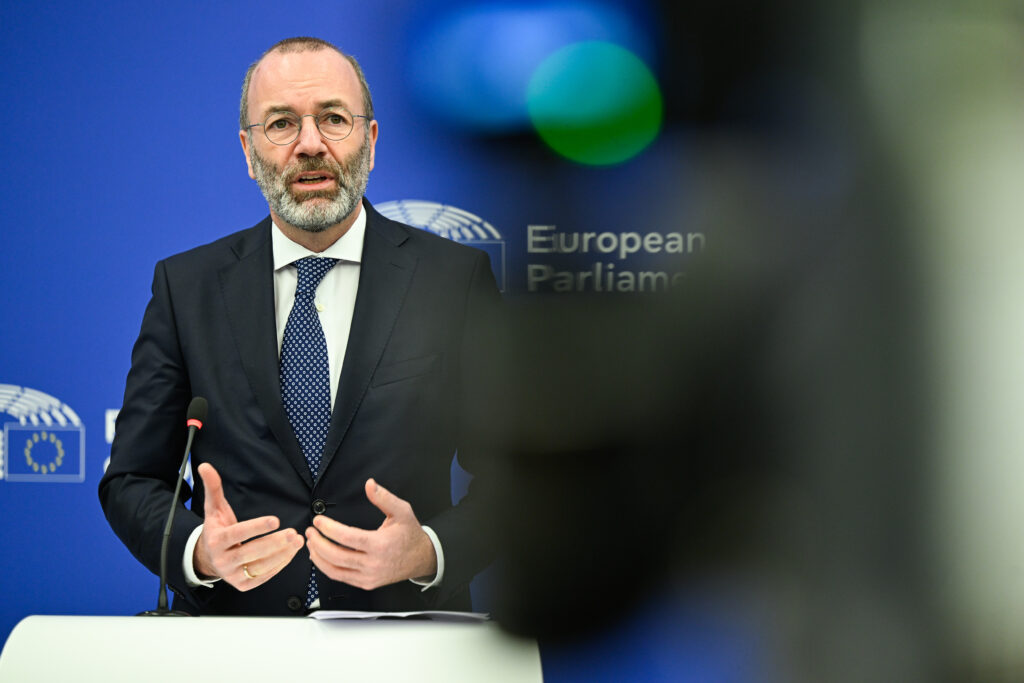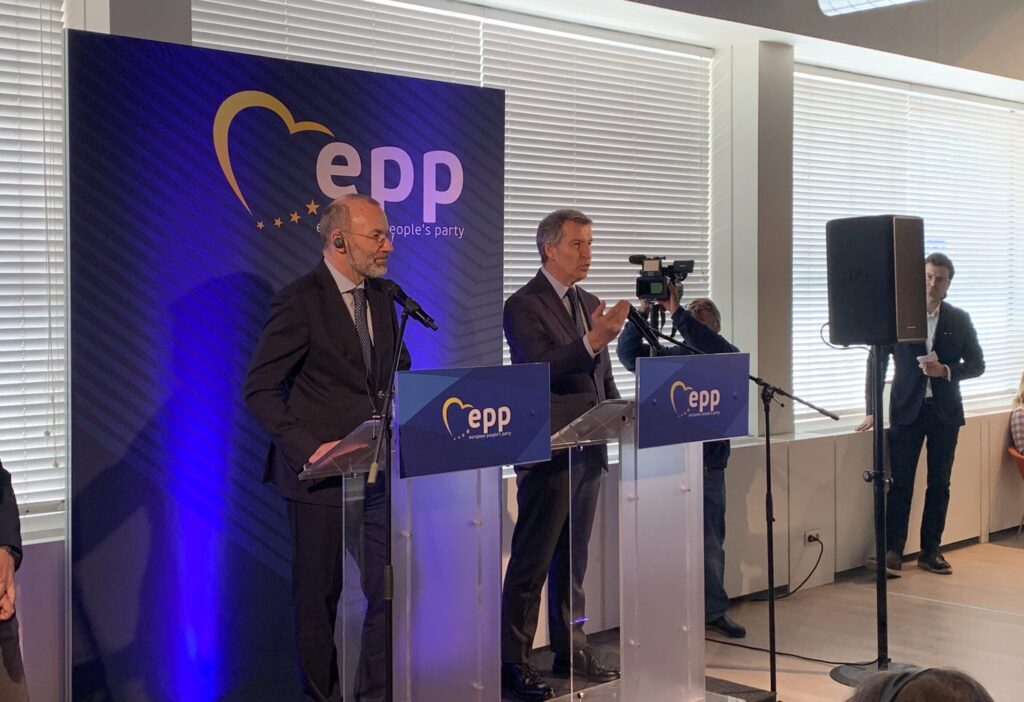Brussels -No one expected any particular twists and turns from the European People’s Party congress in Valencia, which crowned the EPP leader, the Bavarian Manfred Weber, for the second time as party chief. Dolors Montserrat, number two of the Spanish Populares, will most likely be confirmed as secretary-general. There could be a hint of suspense regarding the election of vice presidents since there are more candidates than positions.
However, there was one rather significant setback: yesterday’s massive power outage paralyzed the entire Iberian Peninsula, stranding several Christian Democratic leaders on their way to the coastal city and prompting others to cancel their participation. All this while the shadows of responsibility for the flood disaster that struck Valencia in October loom heavily over the heads of Spanish executives.
The two-day European People’s started today (April 29) and will end tomorrow. In terms of content, the recipe of the EPP is the same, namely that of a center-right party leaning more and more to the right. Cracking down on unlawful immigration, focusing on the economy and competitiveness with accompanying regulatory deregulation, a crusade against the Green Deal, and renewed attention to defense and security, starting with support for Ukraine.
However, the issues are not what the Valencia Congress is about. The 900 or so delegates voted to anoint Manfred Weber as the party’s single helmsman. It was merely a formality, as no alternative candidates challenged him. Even though semi-unknown to the general public, the 52-year-old Bavarian is one of the most powerful figures in European politics. EPP group leader in the European Parliament in Strasbourg since 2014, Weber has also been president of the pan-European party since 2022 when he succeeded Polish Donald Tusk. Ultimately, with 502 in favor and 61 against among the 563 valid votes cast, he was confirmed for a second three-year term.

After the overwhelming success of the Populars at the European elections last June, Weber seems intent on moving toward a substantial merger between the two offices he holds to concentrate power within the Christian Democratic family further in his own hands. He is one of the principal architects of the EPP’s slide to the right, the mastermind pulling the strings of those shifting alliances that, in the House, have seen the center-right align with the forces of the radical and Euroskeptic right in what has been renamed the “Venezuela majority.”
The Weber line has found a solid ally in the Partido Popular (PP) – the Spanish member of the EPP that in Strasbourg boasts the group’s third-largest delegation with 22 MEPs (after the 31 Germans and 23 Poles). Still, some grudges are brooding in the party. Starting with Poland’s Civic Platform (PO), Tusk’s party, which strongly opposes any flirtation with the ultra-right.
For supporters and critics of the “Weber line,” the motivations are mostly tied to domestic dynamics. For the Polish PO, the problem is that its arch-enemies of the PiS sit in the ECR group. For the Spanish PP, the problem is the extreme polarization of domestic politics, where the Populares are, in fact, at war with the Socialist Party (PSOE) of Premier Pedro Sánchez and, in this battle, often and willingly ally with the VOX neo-Francoists.
Be that as it may, the time has not come for Weber’s leadership to be called into question. In the room, almost all the VIPs of the European center-right, including those from outside the EU, supported the Bavarian helmsman. From the head of the EU executive, Ursula von der Leyen, to the president of the European Parliament, Roberta Metsola, via Greek Prime Minister Kyriakos Mitsotakis, Austrian Chancellor Christian Stocker, German Chancellor in waiting Friedrich Merz, and Italian Foreign Minister Antonio Tajani. Guests from non-member countries include Moldovan President Maia Sandu and former Ukrainian President Petro Poroshenko.
“Peace in Europe requires that we take much greater responsibility for our own defense,” the commission chair said from the stage, reiterating that “we must continue to stand with Ukraine” against Russia’s aggression. On the tariffs imposed by Donald Trump, von der Leyen noted that “they are like taxes” as “they harm both consumers and businesses.” At the same time, she also pledged to protect farmers and agricultural production as best she could in the 27 member states.
Thank you for the warm welcome in Valencia.
During the massive power outage, people in Spain & Portugal showed incredible solidarity and resilience.
I want to thank the police, firefighters & traffic controllers.
We will work for better energy security & preparedness in Europe pic.twitter.com/sdMvdEeV0b
– Ursula von der Leyen (@vonderleyen) April 29, 2025
There are, however, also some notable absences. First among them was that of the host, the popular governor of the Valencian Autonomous Community, Carlos Mazón. In any case, a large crowd of protesters rallied to demand his resignation, which did not take place despite the disastrous handling of the late October floods, in which, exactly six months ago, over 230 people lost their lives. By another grim coincidence, the Feria Valencia, the venue of the People’s Congress, was used as a makeshift obituary to deposit the bodies in the aftermath of the catastrophe temporarily.
Rounding that tragic event was a ferocious political battle between Valencia, Madrid, and Brussels, from which the alliance between the Populares and Weber clearly emerged. That same alliance, for days, held hostage the approval of the second von der Leyen term because of cross vetoes on Teresa Ribera and Raffaele Fitto as commissioner candidates. Although the Spanish socialist was later “approved” by MEPs (as were all the other commissioners), the PP delegation in Strasbourg voted against von der Leyen‘s reinstatement in December as payback for not replacing Ribera, who they said was responsible for the carnage in Valencia.
Alberto Núñez Feijóo, leader of the PP and head of the opposition to the Sánchez government, was also supposed to be absent, so much so that MEP Esteban Gonzáles Pons delivered the opening speech of the event in his place. Eventually, Feijóo showed up and spoke to the audience, introduced as “the next Spanish premier.” Also due to yesterday’s events, the resigning Portuguese premier, Luís Montenegro, did not show up.

In Valencia, the solid alliance between Feijóo and Weber was made clear by the confirmation of Dolors Montserrat, who has been the deputy group leader of the EPP in Strasbourg, as secretary-general of the pan-European People’s Party. The vote will be held tomorrow (April 30). However, even in this case, it is a formality as no other contenders exist. Weber defended her appointment, announced by the two leaders earlier this month, as a key step toward a necessary “politicization” of the EU. Montserrat, who is considered a “hawk” for her intransigent positions, will replace the Greek Thanasis Bakolas.
French François-Xavier Bellamy was also confirmed as party treasurer today. Finally, tomorrow, delegates will elect the 10 vice presidents. Vying for those seats are 12 candidates — including the Forza Italia leader Tajani — so someone will necessarily be left out. Some names are seen as already “locked in,” but the rumors circulating in the last few hours do not agree on who can be considered safe.
English version by the Translation Service of Withub




![Nave per il trasporto di Gnl [foto: Wikimedia Commons]](https://www.eunews.it/wp-content/uploads/2024/01/LNG_ship-120x86.jpg)


